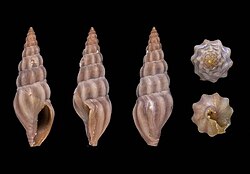Biology:Bela nebula
| Nebular needle conch | |
|---|---|

| |
| Shell of Bela nebula (specimen at the Smithsonian Institution) | |
| Scientific classification | |
| Domain: | Eukaryota |
| Kingdom: | Animalia |
| Phylum: | Mollusca |
| Class: | Gastropoda |
| Subclass: | Caenogastropoda |
| Order: | Neogastropoda |
| Superfamily: | Conoidea |
| Family: | Mangeliidae |
| Genus: | Bela |
| Species: | B. nebula
|
| Binomial name | |
| Bela nebula (Montagu, 1803)
| |
| Synonyms[2] | |
| |
Bela nebula, also known as the nebular needle conch is a species of sea snail, a marine gastropod mollusk in the family Mangeliidae.[2] It is the type species of the genus Bela.
Taxonomy
Bela nebula forms probably a complex, to which Bela laevigata also belongs (Ankel 1936, Van Aartsen et al. 1984) [3][4]
Description
The shell size varies between 5 mm and 14 mm, characteristic of the Bela genus, with three or four initially smooth protoconch whorls, except for the last, which features low, curved axial riblets overrun by a few rows of obsolete spiral elements, which form swollen tubercles at the intersection.[5] The shell consists of eight or nine tumid whorls, with deep sutures. The subsutural band is often beaded. The shell shows strong, slightly curved ribs and narrow, spiral ridges and growth lines. The numerous ridges are finely beaded. The subsutural band is slightly swollen. The aperture of the shell is lanceolate and elongated, with a thin outer lip that becomes angular where it meets the body whorl. There is an anal sinus and a short, wide siphonal canal. [6]
The colour of the shell is variable and goes from white to yellowish brown and orange.
The species breeds in spring and summer, depositing eggs in lenticular capsules.
Distribution
This species occurs on sand and muddy gravel bottoms in European waters off Belgium and the British Isles, in the Northeast Atlantic Ocean off Norway , in the Atlantic Ocean off Spain , Portugal, the Azores and Madeira and in the Mediterranean Sea
References
- ↑ 1.0 1.1 B. Otztürk, Comments on Shells of Mollusca collected from the Seas of Turkey, Turk J Zool, 29, pp. 111-112, 2005 ; accessed : 20 February 2011
- ↑ 2.0 2.1 Bela nebula (Montagu, 1803). Retrieved through: World Register of Marine Species on 8 August 2011.
- ↑ Ankel, Wulf Emmo. Prosobranchia. Akademische Verlagsgesellschaft, 1936.
- ↑ Aartsen, JJ van, H. P. M. G. Menkhorst, and E. Gittenberger. "The marine Mollusca of the Bay of Algeciras, Spain, with general notes on Mitrella, Marginellidae and Turridae." Basteria (ISSN 0005-6219)(Suppl. 2 (1984).
- ↑ "Bela nebula (Montagu, 1803)" (in en). https://www.gbif.org/species/4369330.
- ↑ P.J. Hayward and J.S. Ryland - Handbook of the Marine Fauna of North-West Europe; Oxford University Press 1995; ISBN 0 19 854054 X
- Hayward, P.J.; Ryland, J.S. (Ed.) (1990). The marine fauna of the British Isles and North-West Europe: 1. Introduction and protozoans to arthropods. Clarendon Press: Oxford, UK. ISBN:0-19-857356-1. 627 pp
- de Kluijver, M.J.; Ingalsuo, S.S.; de Bruyne, R.H. (2000). Macrobenthos of the North Sea [CD-ROM]: 1. Keys to Mollusca and Brachiopoda. World Biodiversity Database CD-ROM Series. Expert Center for Taxonomic Identification (ETI): Amsterdam, the Netherlands. ISBN:3-540-14706-3
- Gofas, S.; Le Renard, J.; Bouchet, P. (2001). Mollusca, in: Costello, M.J. et al. (Ed.) (2001). European register of marine species: a check-list of the marine species in Europe and a bibliography of guides to their identification. Collection Patrimoines Naturels, 50: pp. 180–213+
- Muller, Y. (2004). Faune et flore du littoral du Nord, du Pas-de-Calais et de la Belgique: inventaire. [Coastal fauna and flora of the Nord, Pas-de-Calais and Belgium: inventory]. Commission Régionale de Biologie Région Nord Pas-de-Calais: France. 307 pp
- Scarponi et al.: Lectotype designation for Murex nebula Montagu 1803 (Mangeliidae) and its implications for Bela Leach in Gray 1847, Zootaxa 2014
External links
- "Bela nebula nebula" (in en). Gastropods.com. http://www.gastropods.com/7/Shell_11187.shtml.
- Tucker, J.K. 2004 Catalog of recent and fossil turrids (Mollusca: Gastropoda). Zootaxa 682:1-1295.
- MNHN, Paris : Bela nebula
Wikidata ☰ Q4881823 entry
 |

